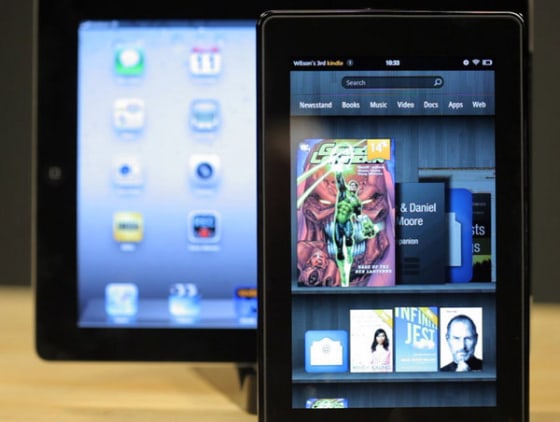Get an iPad, Kindle Fire or Nook Tablet over the holidays? You're not alone: Tablet and e-reader ownership increased by nearly double over the holidays, and more than 1 out of every 4 Americans now has one of the devices, according to a new study.
"The number of Americans owning at least one of these digital reading devices jumped from 18 percent in December to 29 percent in January," said the Pew Research Center’s Internet & American Life Project in a new report on tablet and e-reader ownership.
"The share of adults in the United States who own tablet computers nearly doubled from 10 percent to 19 percent between mid-December and early January and the same surge in growth also applied to e-book readers," which had the exact same increase.
The increase is more than just a run-of-the-mill stat: "In the time we have been doing surveys about the adoption and use of digital technology, we have never seen growth quite like this," said Lee Rainie, director of the Pew Research Center’s Internet & American Life Project.
"The striking uptake of both devices in a month this holiday season has to be a marketplace story — the introduction of Kindle Fire and Nook Tablet at roughly half the price of iPads and existing market players had to be a driver of the tablet adoption; and the drop in prices of e-book readers to levels well below $100 had to have hiked e-book reader adoption," Rainie told msnbc.com.
"But there is also an interesting 'supply side' part of the story that is also likely driving this spurt of adoption. Publishers are putting a lot of effort into e-books; apps developers and media companies are cranking out more and more tools to use on tablets; libraries are making e-books easier to borrow. So, the ecosystem of these devices is becoming more valuable to consumers. It’s a particularly striking version of a classic tech-adoption story. Prices are falling on devices and the value to consumers of using them is increasing."

Pew found that the "surge" in tablet ownership was "especially notable among those with higher levels of education and those living in households earning more than $75,000. More than a third of those living in households earning more than $75,000 (36 percent) now own a tablet computer. And almost a third of those with college educations or higher (31 percent) own the devices. Additionally, those under age 50 saw a particularly significant leap in tablet ownership."
E-reader ownership grew more among women (21 percent) then men (16 percent), Pew said. And those with "more education and higher incomes" also lead the pack, but "the gap between them and others isn’t as dramatic. For instance, 19 percent of those in households earning $30,000-$50,000 have e-book readers. They are 12 percentage points behind those in households earning $75,000 or more in e-book reader ownership. The gap between those income levels on tablet ownership is 20 percentage points."
The findings, Rainie said, "have major implications for every media company, especially book publishers, everyone in a knowledge business, and key community institutions like libraries. They show how radically the tectonic plates of information creation and dissemination are shifting under our feet.”
Pew is studying tablet and e-reader ownership to "understand how people consume media (text, video, and audio) on the devices, how people use them to access the Internet, and how mobile connectivity has affected users." It's part of Pew's "larger research agenda, supported by a grant from the Bill and Melinda Gates Foundation to look at how these devices are affecting people’s relationship with their local libraries, the services those libraries offer, and the general role of libraries in communities."
And while the report is "based on research funded in part by the Bill & Melinda Gates Foundation," Pew issued a disclaimer to make it clear that the "findings and conclusions contained within are those of the author and do not necessarily reflect positions or policies of the Bill & Melinda Gates Foundation."
Related stories:
- Apple vs. the textbook: Can education go paperless?
- iPad 3 has 4G and high-def screen, says Bloomberg
- iPad users download 3 billion apps
- Kindle Fire will be No. 2 tablet after iPad
- Q&A: Kindle Fire vs. Nook Tablet vs. iPad
Check out Technolog, Gadgetbox, Digital Life and In-Game on Facebook, and on Twitter, follow Suzanne Choney.
